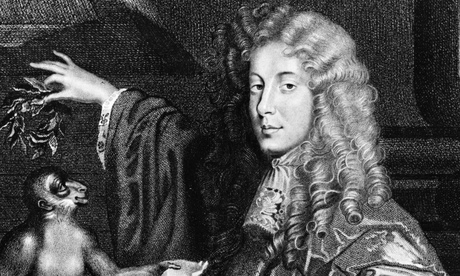
Lord Rochester, the Restoration poet and rake, was chief wit at the court of King Charles II. Any gallant could enjoy the sexual and alcoholic freedom that followed the riddance of Puritan morality in 1660s England. But only Rochester could yell at the king's phallic-shaped sundial – "What! Do you stand here to fuck time?" – and proceed to smash it up.
Drunk or sober, Rochester wrote more candidly about sex than anyone before the 20th century. He was (he said) "the wildest and most fantastical odd man alive"; his poetry, at times pornographic, was not for the faint-hearted. Graham Greene had to wait 40 years until a publisher agreed to bring out his piquant biography, Lord Rochester's Monkey. Greene wrote it in the early 1930s, when Rochester was to be found only in cautious anthologies of Restoration verse or, if unexpurgated, wrapped in brown paper on the topmost shelves of bookshops. Obscenity laws and Rochester did not get on. The Disabled Debauchee, in which a pox-ridden roué looks back on his salad days, remains one of the filthiest poems in the English language. Only three of Rochester's poems were published in his lifetime.
To improve on Greene would be difficult; Jeremy Lamb had a stab at it in his 1993 biography, So Idle a Rogue, which placed Rochester in a tradition of English satiric verse but over-emphasised the alcoholism. Alexander Larman, in Blazing Star, provides a worthy addition to Lamb. Rochester was encouraged in his mischief by the Loyalist backlash against Puritan correctitude, says Larman. Amid the wags and blades of that frivolous age, Rochester could misbehave royally. His antics were often at loggerheads with the fripperies of the Carolinian court, though. A contradictious man, Rochester might be "swiving" and duelling the one day, and a devoted husband the next.
His Satyr against Reason and Mankind, with its mockery of the idea of man as a rational animal, foreshadowed the unsmiling comic genius of Jonathan Swift: "I'd be a dog, a monkey, or a bear/ Or anything but that vain animal/ Who is so proud of being rational."
Sex remained Rochester's abiding theme. The Rabelaisian lampoons he wrote for private amusement are enduringly scabrous. Signior Dildo, a satire on social climbing and careerist bed-hopping within the court, was such a success that for a while dildoes became known as "signiors", Larman says.
Born in 1647 to Oxfordshire landowners, Rochester died at the age of only 33, of syphilitic complications. In a country shadowed by the violence of the civil war and the apocalyptic spectacle of the 1665 plague, Rochester "blazed out his youth and health in lavish voluptuousness" and booze, according to Dr Johnson. His luxurious genius cannot be defined solely in terms of alcoholism, though. Rochester's anarchy was innate and had little need of stimulation. His alter ego, Dr Alexander Bendo, a shady Italian pathologist who trafficked in cures for scurvy and other maladies, anticipated the lugubrious Dr Benway of Burroughs's Naked Lunch. Rochester's was a curiously modern spirit.
Conceivably, alcohol was responsible for his vicious attack on his arch enemy Dryden. In a street off Covent Garden one night in 1679, the poet laureate was cudgelled almost to death by hired thugs. Rochester was the prime suspect but Larman exonerates him: he was too ill at the time, apparently, to organise the beating. We cannot know for sure.
In well-researched pages, Larman takes us through the high adventure of Rochester's life and loves. His affair with the captious, teasing actress Elizabeth Barry provided a rare moment of tenderness in this "happy minute" (as Rochester called it) of life. Reportedly it was only in the cold light of sobriety that he was able to turn to Catholicism and make a death-bed repentance. His 11th-hour conversion was most likely a story put about by friends, Larman suggests, convincingly.
The biography is not without its faults. Cliches are in evidence ("roaring trade", "dogged persistence") and the odd value judgment is made ("Bendo, being Italian and therefore given to floral verbosity…"). Yet Rochester's life, with its tumultuous merriment and moments of dark self-loathing, can hardly fail to interest. Blazing Star paints a picture of a great poet who flared brightly before burning out.

